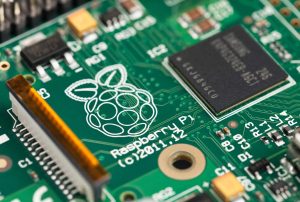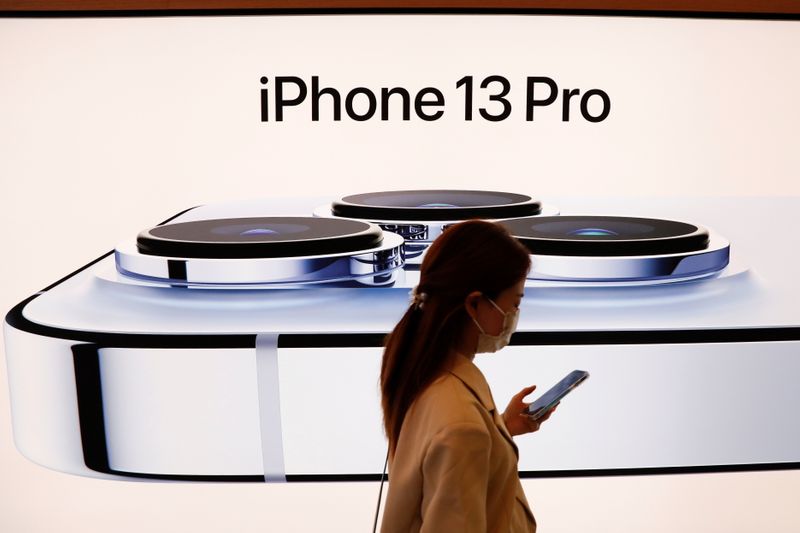© Reuters. Apple’s Vision Pro headset is on display at Apple’s annual Worldwide Developers Conference at the company’s headquarters in Cupertino, California, U.S. June 5, 2023. REUTERS/Loren Elliott
(Reuters) – Apple Inc (NASDAQ:) unveiled its first augmented-reality (AR) headset, as well as a series of upgrades to its devices and software, at the company’s annual developers conference on Monday.
Apple’s Vision Pro, pitted against Meta Platforms Inc (NASDAQ:)’s Quest line and PlayStation VR from Sony (NYSE:) Group, marks the iPhone maker’s foray into a new product category since the Apple Watch was launched nine years ago.
Here are the major launches made at the event:
VISION PRO
After months of speculation, Apple finally showed off its AR headset. Starting at $3,499 – three times Meta’s priciest device – it will begin retailing early next year. The headset, that looks like ski goggles, blends virtual and augmented reality features, allowing its wearer to see digital content superimposed on their surroundings.
Users can virtually project the apps onto the space around them and control interactions with the apps through eye movement, hand gestures and voice.
Apple said the device will run the Disney+ streaming service, Microsoft Corp (NASDAQ:)’s Office suite and apps from Adobe (NASDAQ:) Inc.
Vision Pro sports 12 cameras and a digital crown similar to the Apple Watch to toggle between the AR and VR environments. It works with an external battery pack that has a two-hour capacity and connects to the device through a snap-on cable.
The headset is powered by Apple’s M2 chip and a new custom-made chip called R1, which Apple said is designed to process information from its sensors in less time than the blink of an eye.
It will run on VisionOS.
M2 ULTRA CHIP
Apple unveiled M2 Ultra, its most-powerful processor so far, that comes to its desktop computers Mac Pro and Mac Studio. The chip is essentially two of Apple’s largest M2 chips bonded together, a similar approach Apple took to boosting the performance of its M1 chips. It features a 24-core central processing unit and delivers 20% faster performance than M1 Ultra.
LARGER MACBOOK AIR, POWERFUL DESKTOPS
Apple launched a 15-inch MacBook Air featuring the M2 chip and an 18-hour battery life. Starting at $1,299, the variant comes a year after Apple upgraded the 13-inch MacBook Air with the same processor. Apple also lowered the price of the base 13-inch version by $100 to $1,099.
The company beefed up its desktop computers, introducing a new version of its flagship Mac Pro with the M2 Ultra chip, starting at $6,999. It also upgraded the more compact Mac Studio with M2 Ultra and M2 Max chipsets.
WIDGETS FOR APPLE WATCH, OS UPGRADES, JOURNALING APP
Apple announced fresh versions of operating systems across its products.
The new iOS 17 brings smart display-like features to iPhone, which can now double as a digital clock or a digital assistant when placed horizontally.
Apple also made upgrades to its native apps iMessage, virtual keyboard and FaceTime, which gets a voicemail feature. The Phone app also got an update that allows users to create personalized contact posters for when they receive a call.
Users of the iPhone will also be able to share their contact information with another user in proximity through a new feature called NameDrop.
The company also introduced a journaling app for the iPhone, called Journal, that uses in-device machine learning to give writing suggestions curated from photos, location and other information that’s on the phone.
More striking upgrades came to Apple Watch with the introduction of widgets.
WatchOS 10 adds widgets for everything from weather information to calendar appointments on the Apple Watch. Deeper widgets’ support was also added to the latest iPad and Mac operating systems.
Read the full article here












